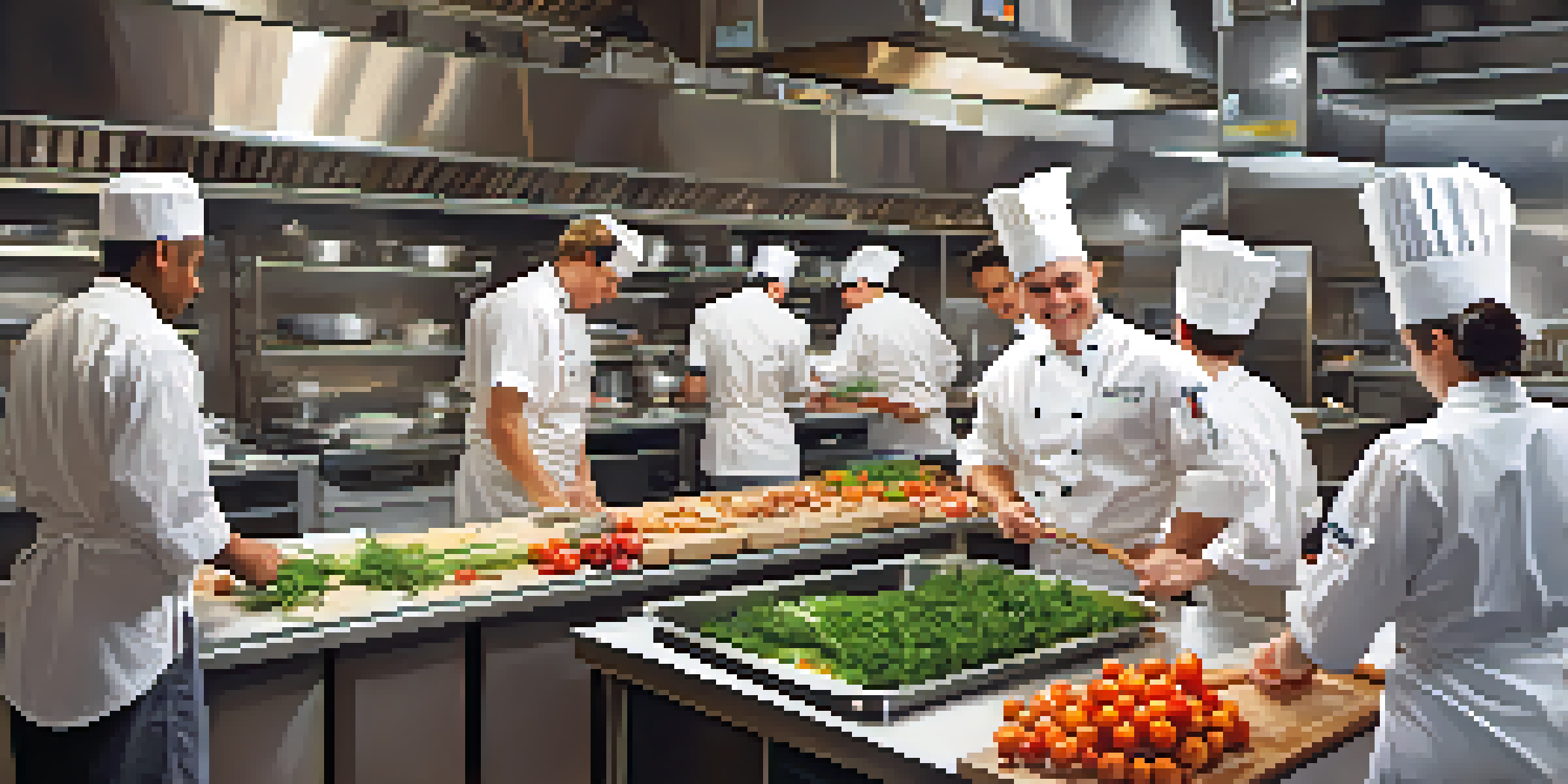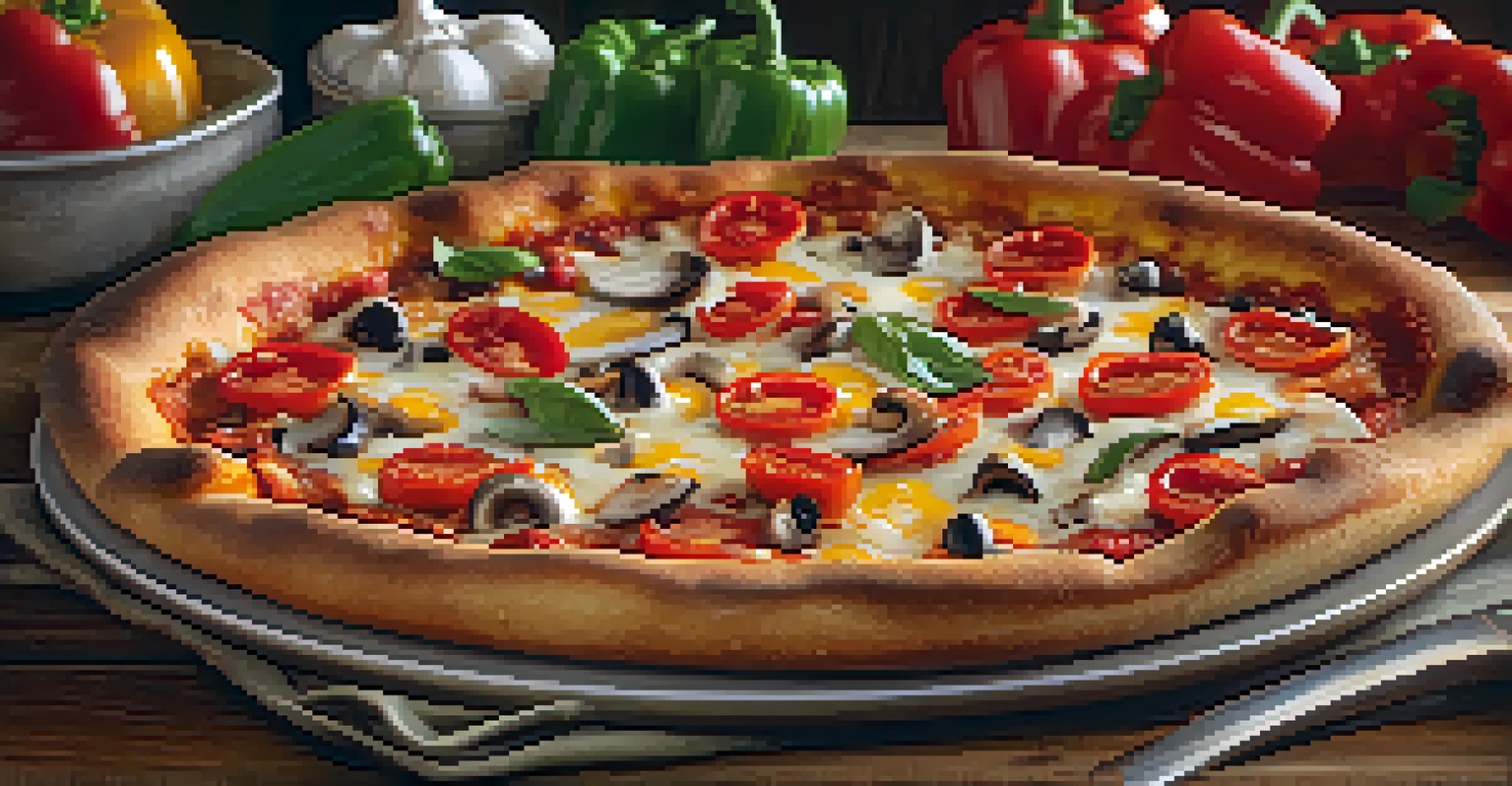Chicago's Culinary Schools: What You Need to Know

Why Choose Culinary Schools in Chicago?
Chicago is a vibrant city known for its diverse food scene, making it an ideal location for culinary education. With a rich history of gastronomy, students can immerse themselves in a culture that celebrates food from all corners of the globe. Choosing a culinary school here means you'll have access to top-notch instructors and industry connections that can jumpstart your career.
Cooking is like love. It should be entered into with abandon or not at all.
Moreover, Chicago's culinary schools often collaborate with local restaurants and food businesses, providing students with valuable internships and hands-on experiences. This connection to the local culinary community enhances the learning experience, allowing students to apply their skills in real-world situations. Imagine learning to make deep-dish pizza in the heart of the city where it was born!
In essence, pursuing culinary education in Chicago opens doors to a world of opportunities, from fine dining to food trucks. It's not just about cooking; it's about understanding the culinary landscape and finding your unique niche in it.
Types of Culinary Programs Available
When it comes to culinary education, Chicago offers a variety of programs to suit every aspiring chef's needs. From diploma programs focused on foundational skills to more in-depth associate and bachelor's degrees in culinary arts, students can choose the path that aligns with their goals. Each program offers a unique blend of kitchen training, food science, and business management.

If you're interested in specialized training, many schools also offer pastry and baking programs, which can be a delightful way to dive into the sweeter side of cooking. Additionally, some institutions provide courses in nutrition, food photography, or even restaurant management, catering to the diverse interests of students. This flexibility allows you to craft your culinary journey.
Chicago: A Culinary Hub
Chicago's vibrant food scene offers culinary students access to diverse cuisine and valuable industry connections.
Ultimately, the diversity of programs available means that whether you're a home cook looking to refine your skills or a serious student aiming for a culinary career, there's something for everyone in Chicago's culinary schools.
Top Culinary Schools in Chicago to Consider
As you explore culinary schools in Chicago, a few stand out due to their reputation and quality of education. The Culinary Institute of America, while not located directly in Chicago, has a campus nearby and is renowned worldwide for its programs. Closer to downtown, Le Cordon Bleu Chicago offers an excellent curriculum focusing on classical techniques and modern cuisine.
The only real stumbling block is fear of failure. In cooking, you’ve got to have a what-the-hell attitude.
Another noteworthy option is the Kendall College School of Culinary Arts, known for its hands-on training and strong industry ties. Their students often find placements at some of the best restaurants in the city. Additionally, the Cooking and Hospitality Institute of Chicago provides a robust program that emphasizes both culinary skills and service excellence.
Choosing the right school is crucial, so take the time to visit campuses, meet instructors, and consider the programs that resonate with your culinary aspirations.
Career Opportunities After Culinary School
Graduating from a culinary school in Chicago can open a wide array of career paths. Many graduates find themselves working in restaurants, but the culinary field is much broader. Opportunities exist in catering, food styling, product development, and even culinary education, allowing graduates to explore various avenues based on their interests.
In addition to traditional roles, many chefs are carving out niches in food blogging, social media, and culinary consulting. With Chicago's food scene continually evolving, there's always a demand for innovative thinkers who can bring fresh ideas to the table. Networking during school can also lead to exciting opportunities and collaborations.
Diverse Culinary Programs Available
Culinary schools in Chicago provide a variety of programs, from diplomas to specialized training in areas like pastry and nutrition.
The key is to remain adaptable and open to different roles within the culinary world. Your unique experiences and interests will help you find a fulfilling career that reflects your passion for food.
The Importance of Hands-On Training
One of the most significant advantages of attending culinary school is the emphasis on hands-on training. Unlike traditional academic settings, culinary schools prioritize practical experience, allowing students to learn by doing. This immersive approach builds confidence and helps you develop essential skills in a real kitchen environment.
In these training sessions, students often work alongside their peers, simulating a professional kitchen atmosphere. This teamwork fosters collaboration and communication, essential skills for any culinary professional. Plus, the chance to experiment with new recipes and techniques in a supportive environment is invaluable.
Ultimately, hands-on training is what sets culinary education apart, allowing aspiring chefs to transition into the workforce more seamlessly and with a solid foundation of skills.
Financial Considerations for Culinary Students
Investing in culinary education is a significant decision, and understanding the financial aspects is crucial. Tuition can vary widely among culinary schools, so it's essential to research your options and budget accordingly. Many schools offer financial aid, scholarships, and payment plans to help ease the financial burden.
In addition to tuition, consider other expenses such as kitchen supplies, textbooks, and uniforms. These costs can add up, so planning ahead is wise. Some schools may provide kits for students, while others require you to purchase your own, so be sure to factor this into your costs.
Hands-On Training is Key
The emphasis on hands-on training in culinary schools equips students with practical skills and confidence for their future careers.
While the financial commitment may seem daunting, remember that culinary skills can lead to a fulfilling career that often provides a good return on investment. Many graduates find their passion drives them to success, making the initial investment worthwhile.
Preparing for Culinary School: Tips and Advice
Before diving into culinary school, there are a few steps you can take to prepare yourself. First and foremost, spend time in the kitchen! Familiarizing yourself with basic cooking techniques and kitchen tools will give you a head start. Whether it’s mastering knife skills or learning how to sauté, practice makes perfect.
Additionally, consider researching the specific schools you're interested in, and reach out to current students or alumni for insights. Understanding the school's culture and expectations can help you decide if it's the right fit for you. Many schools also host open houses or workshops, which can be a great way to experience the environment firsthand.

Lastly, cultivate a positive mindset. Culinary school can be intense, but embracing challenges with curiosity and persistence will enhance your experience and growth as a chef.